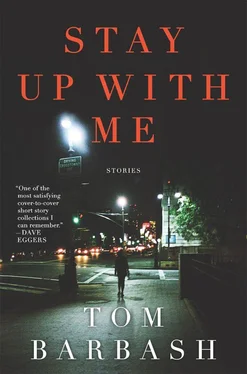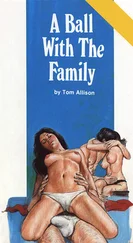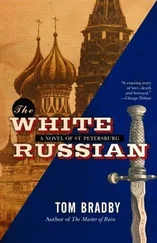Alice and Henry hold hands up the stairs and as they enter Henry’s clean apartment, it crosses his mind that maybe they could try things again, because it was easy in a way.
They sit on his bed and kiss, and then slip beneath the white down quilt. Alice asks him, “You don’t think he’s a lost cause, do you?”
“I haven’t given up on him,” he says.
From her confused silence, he realizes she isn’t asking about his father. It stumps him for a moment, and then he remembers.
“Oh, right,” Henry says. “He’ll come back.”
“Weird place to bring it up, I know. But I kind of like him. I didn’t mean to be rude to him.”
And then neither of them says anything for a while.
She places her arm across his chest. “You’re so good for me, Henry,” she says. “You really are.”
He feels very tired, and then very cynical, like someone who buys a car and then learns the engine is dead. He turns into his pillow then and lets his eyes close.
After a while, he hears her softly whispering his name, “Henry… Henry?”
“What?”
She moves his hand between her legs.
“Do you want to?” she says.
“Let’s go to sleep,” he says, and turns away from her.
“I want to,” she says, spooning him. “No one gets me like you do.”
He thinks of booting her out, though he has neither the energy nor the inclination. The heat kicks on again with a clank and hiss.
He will move from New York, he thinks. There is nothing to keep him here other than his father, and he can come back to visit, and monitor his care by phone, from a distance — but he will not stagnate here another year. His father will be happy for him. He thinks of places he can go, Boston, or Los Angeles where he has contacts, and the sort of man he would like to be when he gets there.
“It’s all for the best,” he says to Alice, and tries to explain why, but in his sleepiness he loses the strand, nods off in midsentence, and drifts back to the dream: A sand dune and the smell of seaweed. His tanned and healthy father carrying a bucket of mussels his mother would use for bouillabaisse. The cousins are over and in the back of the house Henry has built a fort out of milk crates.
“Henry,” the voice says again. “ Henry .”
But he won’t come back for her this time.
She keeps speaking, or maybe she’s only speaking in his dream, but likes that he can leave her like this, that he can find a place away from her.
“I’m sorry, ” the voice says now. It isn’t Alice anymore.
“Say it again,” he says.
“I’m so sorry, sweet Henry.”
“Of course you are.”
K istler’s second winter in upstate New York was a season of fires, snowstorms, and deaths. There was a killing down in Granby where two boys, barely eighteen and flying on acid, shot an old man in the head. There were three stabbings — husbands and wives having problems — and a fire at Bodley High School that put seventeen children in the hospital. The gusts outside were so strong one of the firefighters was blown fifty yards through the air from a ladder. A priest in Albion was charged with molesting four altar boys, a seven-year-old was knocked flat between the frosted wheels of a ’78 Cadillac, and an old woman threw herself off a bridge into Onondaga Creek.
Kistler covered the stories closely; he talked to the families and tried to stay clear when people asked him to, when they wanted to be left alone. But more times than not they told him what they were feeling and what they thought of a world that had come down so hard on them. They read his pieces at wakes, asked him to calling hours, seated him with grieving cousins and siblings. It was the poorest county in upstate New York, rural to the core, and still they made him feel like family. He was not a religious man, but there were times when his job felt like a calling.
In March, during a news lull on the cops beat, Kistler was moved to night meetings and features. They buried his work on the regional page and his mind started to drift. He’d begin an interview and then daydream. He’d be miles away and the person would be talking and then Kistler would see a hand waving in front of his face—“Hello,” they’d say, “anybody home?” or “Have you heard enough?” He’d look at his pad and he wouldn’t have a single quote. He might not have turned on his digital recorder. It was even worse at the meetings they asked him to cover. He knew what happened at these things was important, that a shift in zoning laws or problems at a sewage treatment plant were matters people cared about, but it felt too much like taking dictation.
In the office, when he was bored, he’d pore through a book that had been left by his predecessor in the bureau, a photo-diary by a Danish journalist with a long braided beard who spent five years in American slums with junkies, prostitutes, and transvestites. There were dark shadowy photos of couples shooting up in stairwells, two boys beating an old man in an alleyway, a sharecropping family with torn, soiled clothing squatting in the corner of a sloping shack. The book had a far-reaching arc to it, a design and scheme, and a beating heart, Kistler thought. It made his work seem trivial and pointless. This was the world the politicians had forgotten about. Kistler could not shake the feeling that he too was letting someone down.
The week after the county’s budget talks — an edge-of-the-seat affair — Kistler got the idea to write town profiles, to roam the back roads of moribund hamlets no one ever bothered to explore. Most of the county was agricultural, but not everyone farmed. Migrants turned profits for a few wealthy landowners, but the smaller granges had foreclosed. The major industry had revolved around the rail lines, which died sixty years ago. In hamlets like Williamstown, Paris, and Albion, more than half the people were unemployed. Kistler wanted to shake things up, to depict a way of life few people ever saw. There was an important story in rural poverty, one the big media outlets never covered, one of neglect, isolation, and domestic violence.
He could see the harbingers when he pulled through town to the Paris diner: scarred paths overgrown with honeysuckle thickets, a rimless backboard in a weed-filled playground, two children hurling a ball where a hoop should be.
Inside the diner, four men in flannel shirts sat at a table in the corner, under a shelf of mildewed trophies. Northern European faces, Kistler guessed. High cheekbones, sturdy jaws. Kistler ordered a beer and walked with it over to their table.
One of the men smiled broadly, betraying his yellow teeth. Smoke rose from the table in curlicuing eddies that whirled toward a ceiling vent. The man cleared a space for Kistler.
“What can we do for you?” he asked.
“Oh, we’re thinking of doing a story on the hamlet.”
“Who is we ?”
“The newspaper.”
“What do you want to do a story on?”
“The town itself. Sort of a profile.”
The men looked at one another and laughed.
A gaunt older man they called Joseph, around sixty, with tiny blue eyes and two days of beard, took Kistler’s arm. His fingers pinched like a clothespin below Kistler’s shoulder.
“You’re not going to dig up the fire stuff, are you?”
“What fire stuff?” Kistler asked.
“Never mind,” he said. “Every five years or so someone comes out here and writes something about the fire.”
It piqued Kistler, but he knew not to press just then. He took their names and he asked them about town lore, the early days, their grandfathers and town politics. They told him about the cheese mill, a shoe factory, two foundries, and an epic weeklong blizzard ten years ago.
Читать дальше












